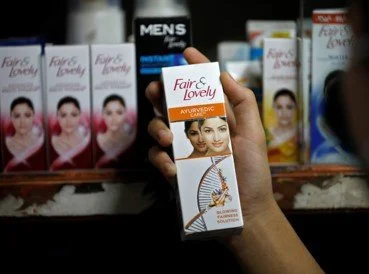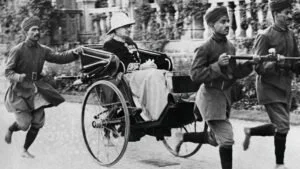Cosmetics and Colonialism
During their occupation of India, the British imposed their ideals of beauty. This combined with the hierarchy of the caste system led to the idea of fair skin being the pinnacle of beauty. Although there was an overall difference in skin tone in the Hindu caste system, British colonization and their favor of lighter-skinned people was the catalyst for the widespread colorism we see today. Cosmetic companies have long taken advantage of this inequality to milk profits from ingrained insecurities.
The British justified their rule over India and the forced changes they made through the belief that they were superior and correct. The idea of patriotism over India became synonymous with the idea of the "white man's burden", to correct the brutish people who lived in the colonies.
Within the caste system, higher classes generally had lighter skin because they weren’t doing manual labor like lower castes, a fact often cited by people who don’t believe colorism is an issue. British colonization increased this divide because they hired the lighter-skinned Indians, believing those who looked more like them were superior and more intelligent. They had extreme disgust for Indians, especially Indians with darker skin and non- European features. Over time, light skin and European features became associated with success and beauty because all the successful rich people had these qualities. India was under British rule for so long, that even once they gained independence, these ideas stuck around. Fair & Lovely preyed on these ideas that are now deeply rooted in Indian culture. Colorism affects people today in everything from body image to employment to love.
This image shows a Pear’s soap advertisement from 1899. During this time, the British raj was in power, so the British government was making decisions about India, without Indian consent. In the illustrated ad the text says "Pear's soap is a potent factor in brightening the dark corners of the earth". The word choice of brightening reminds me of how colonialism was the catalyst for colorism in India. Euro-centric ideals of beauty were an example of a part of British culture that was fused with Indian culture over the period of colonization. The British correlation between cleanliness and correctness would naturally place them above the Indian people because they had whiter skin. This idea extends to cleanliness being associated with whiteness, and thus correctness and superiority belonging to clean, white people.
On the other hand, Indian people had darker skin, so they were the opposite, dirty and dark. This carries over into the ideas of Fair & Lovely and the beauty standard of white skin. This also brings up the idea that the British are enlightened and more knowledgeable than the Indians. The idea of the "dark corners of the earth" alludes to the difference in skin color, making the Indian people incorrect and unclean. This also refers to the idea that the British are enlightened and knowledgeable, while Indians are living in the dark corners of the world and need help advancing. These ideas led to the reasoning that the British were helping India by enforcing their ideas because they were correct and enlightened, associating these attributes with whiteness and "cleanliness".
These racist ideas have carried into modern India through products like Fair & Lovely, a skin-lightening cream, created in 1975. It is owned by the umbrella company Unilever and holds a whopping 50-70% of the skin whitening market in India (based on statistics from 2006). Fair & Lovely’s advertisements promote colorism and the idea that darker skin is ugly and needs to be corrected. Though they claim to be filling a market that already exists, their advertisement techniques are clearly perpetuating the culture of colorism started by colonization.
Although the era of Colonial India is over, some ideals are still prevalent. The inequality exacerbated by racist hiring systems created by the British has emphasized the idea that people with light skin and European features are successful and beautiful. Cosmetic brands have preyed on this hierarchy, prodding the scars of colonialism, and preying on insecurities that linger as reminders of a hateful past. These companies profit by dividing people and perpetuating heinous, racist ideas that should have been invalidated decades ago.
Sources:
Amit/Reuters, Dave. “Skin Lightening Cream 'Fair & Lovely' to Change Name after Backlash.” NBCNews.com, NBCUniversal News Group, 25 June 2020, www.nbcnews.com/news/asian-america/skin-lightening-cream-fair-lovely-change-name-after-backlash-n1232124.
Frayer, Lauren. “Black Lives Matter Gets Indians Talking about Skin Lightening and Colorism.” NPR, NPR, 9 July 2020, www.npr.org/sections/goatsandsoda/2020/07/09/860912124/black-lives-matter-gets-indians-talking-about-skin-lightening-and-colorism.
Karnani, Aneel. “Doing Well by Doing Good Case Study: ‘Fair & Lovely ...” Doing Well by Doing Good Case Study: ‘Fair & Lovely’ Whitening Cream , Stephen M. Ross School of Business The University of Michigan , Mar. 2007, www.un.org/esa/coordination/DWDG.Fair.Lovely.SMJ.pdf.
Mishra, Neha. “Washington University Global Studies Law Review.” India and Colorism: The Finer Nuances , REVA University, 2015, openscholarship.wustl.edu/cgi/viewcontent.cgi?referer=&httpsredir=1&article=1553&context=law_globalstudies.
https://www.researchgate.net/figure/Pears-Soap-ad-in-McClures-Magazine-October-1899_fig2_342232353


